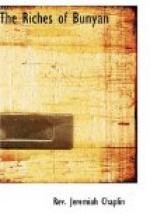Well, at the third season he comes again for fruit, but the third year is like the first and second, no fruit yet; it only cumbereth the ground. What now must be done with this fig-tree? Why, the Lord will lop its boughs with terror; yea, the thickets of those professors with iron. I have waited, saith God, these three years; I have missed of fruit these three years; it hath been a cumber-ground these three years; cut it down. Precept hath been upon precept, and line upon line, one year after another, for these three years, hut no fruit can be seen; I find none: fetch out the axe.
“Lord, let it alone this year also.” Here is astonishing grace indeed; astonishing grace, that the Lord Jesus should concern himself with a barren fig-tree; that he should step in to stop the blow from a barren fig-tree! True, he stopped the blow but for a time; but why did he stop it at all? Why did he not fetch out the axe? Why did he not do execution? Why did he not cut it down?
Barren fig-tree, it is well for thee that there is a Jesus at God’s right hand, a Jesus of that largeness of pity to have compassion for a barren fig-tree; else justice had never let thee alone to cumber the ground, as thou hast done.
See the care, the love, the labor, and way which the Lord Jesus, the dresser of the vineyard, is fain to take with thee, if haply thou mayest be made fruitful.
“Lord, let it alone this year.” Lord, a little longer; let us not lose a soul for want of means. I will try, I will see if I can make it fruitful; I will not beg a long life, nor that it might still be barren, and so provoke thee. I beg for the sake of the soul, the immortal soul; Lord, spare it one year only, one year longer, this year also; if I do any good to it, it will be in little time. Thou shalt not be overwearied with waiting; one year and then—
Barren fig-tree, dost thou hear what a striving there is between the vinedresser and the husbandman for thy life?
“Cut it down,” says one; “Lord, spare it,” says the other. “It is a cumber-ground,” saith the Father; “One year longer,” prays the Son: “let it alone this year also.”
“Till I shall dig about it and dung it.” I doubt if it is not too much ground-bound. “The love of this world and the deceitfulness of riches” lie too close to the roots of the heart of this professor. The love of riches, the love of honors, the love of pleasures, are the thorns that choke the word; how then can there be fruit brought forth to God?
Barren fig-tree, see how the Lord Jesus by these words suggests the cause of thy fruitlessness of soul. The things of this world lie too close to thy heart; the earth and its things have bound up thy roots; thou art an earth-bound soul, thou art wrapped up in thick clay. “If any man love the world, the love of the Father is not in him;” how then can he be fruitful in the vineyard?
This kept Judas from the fruit of caring for the poor. This kept Demas from the fruit of self-denial. And this kept Ananias and Sapphira his wife from the goodly fruit of sincerity and truth. I John, 2:15, 16; John 12: 6; 2 Tim. 4:10; Acts 5: 5-10; I Tim. 6: 9, 10.




